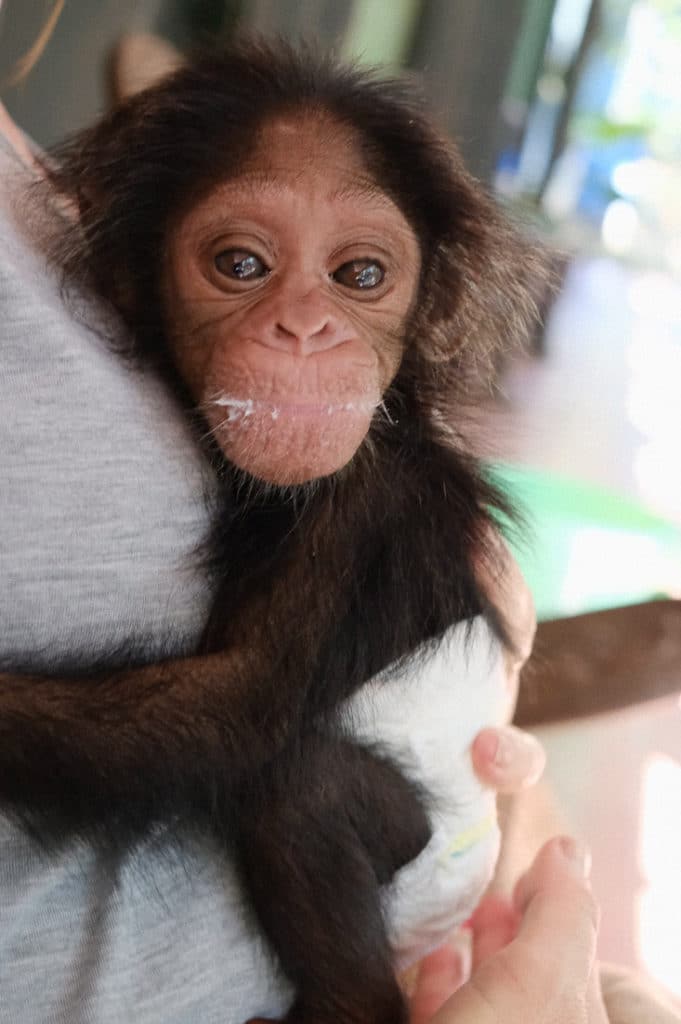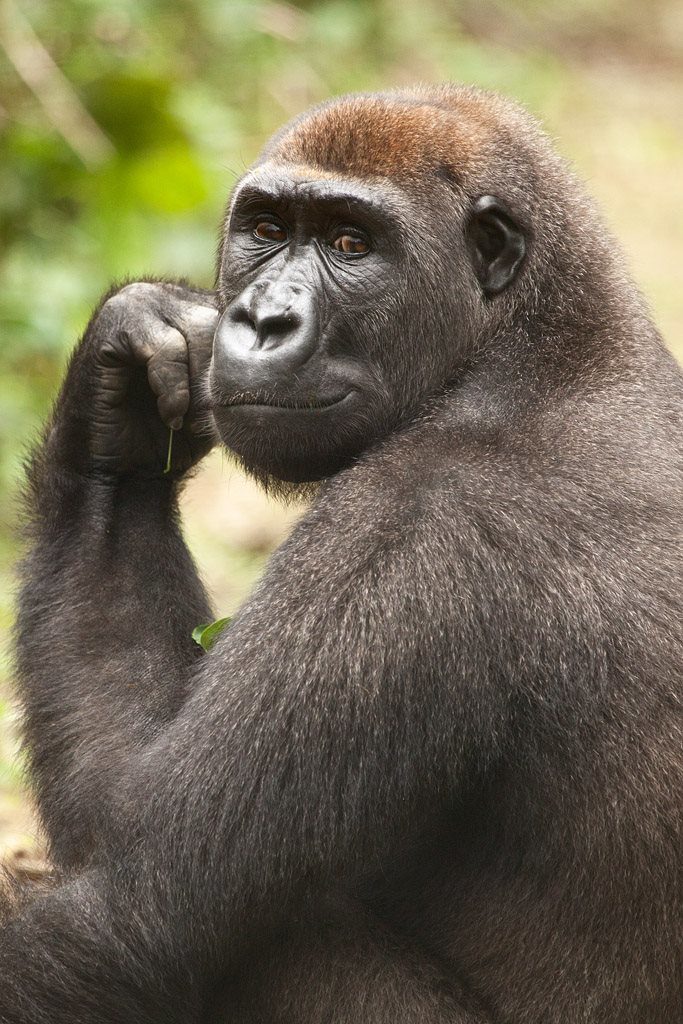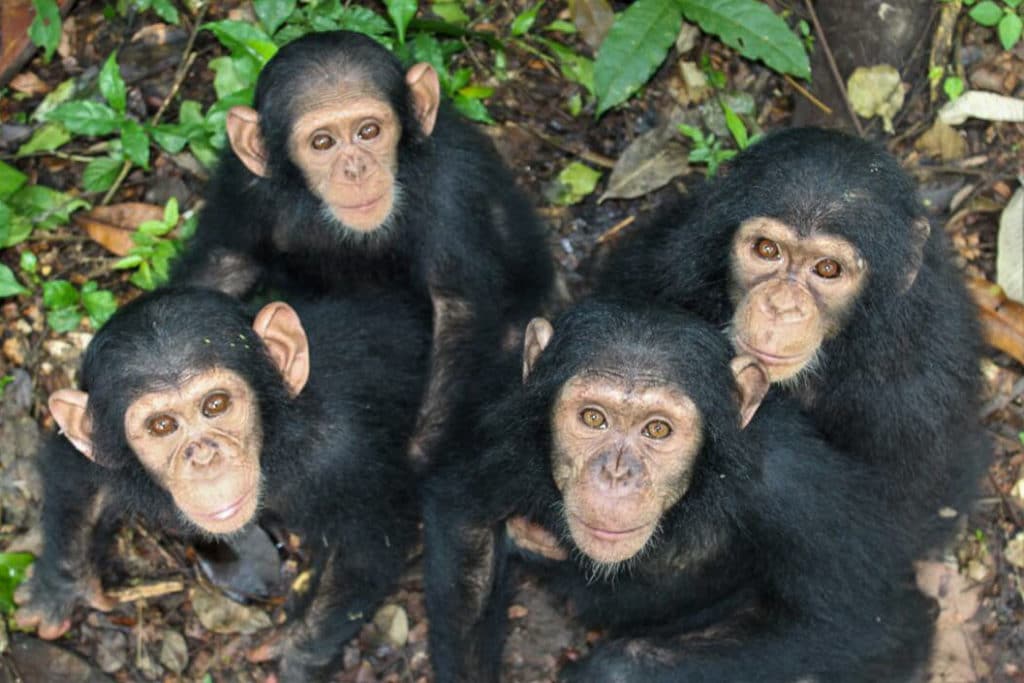Having volunteered at Ape Action Africa, I have seen first hand how hard working, passionate and caring the staff are, and how absolutely dedicated they are to all the animals that call this sanctuary home. I’ve written about my experiences at the sanctuary, which you can read here, but I felt it wasn’t enough. That’s why I reached out to AAA and asked the staff to answer 11 important questions, that I felt you should know. It is my hope that these questions and corresponding answers help you to have a clearer understanding of the sanctuary’s purpose, mission, and goals for the future. I also hope the following information gives you the encouragement needed to support this sanctuary either by volunteering your time or via much needed monetary donations.
1. What animals arrive at your project and why?
We mainly receive monkeys at Mefou Sanctuary, followed by smaller numbers of chimps and lowland gorillas.
They all face three main threats in the wild:
- Loss of habitat due to logging and ever-expanding human settlement in and around forests.
- The illegal bushmeat trade. In Cameroon and other neighbouring countries, primates are eaten and their meat fetches a high price, particularly when sold overseas as a luxury or exotic food item. Poachers go into the forest and shoot several members of a monkey, chimp or gorilla family, butcher and smoke the adults to sell as meat and remove any babies they find to sell on alive.
- The illegal wildlife trade. Whilst infants have no value as meat, they are very valuable when sold outside of Africa as pets or new acquisitions in roadside or even well-established zoos. The illegal wildlife trade is the second most lucrative trade in the world today, bringing in more money than drug trafficking. Thousands of infants fall victim to it each year, and the lucky ones are intercepted and brought to Mefou Sanctuary.

Image credits: Ape Action Africa/Ian Bickerstaff
2. Do the animals have the opportunity to be released?
It is our hope that one day the great apes and monkeys in our care will be released back into the wild, where they belong. We have been working with two other sanctuaries in Cameroon for the last few years to find a suitable location for release. Unfortunately, we have not yet been successful.
Wildlife release is complex and requires very specific conditions. Not only to support a released population but allow it to grow without negatively impacting any remaining wild populations. At the moment Cameroon does not have any sites that can offer these conditions. However, we will continue to search for one.
3. Do you allow the animals at the sanctuary to breed? If not, why?
No, we don’t allow the animals to breed, because we are a small charity with very limited financial resources, which we need to use to help rescued orphans.
Whilst it may sound counter-intuitive to prevent endangered animals from breeding, we can’t afford to increase our population of animals by allowing them to breed. Space is also an issue and again, we need space for rescued animals.
Our animals are given contraception but as with humans, contraception can fail and we have had unplanned births in the sanctuary. They are given contraception rather than surgical intervention so that should we ever find a suitable release site, animals are potentially still able to breed should they be safely released.

Image credits: Ape Action Africa/Ian Bickerstaff
4. Why are volunteers important to you?
Volunteers are incredibly important to us. They bring a wide range of life experience, fresh eyes, and enthusiasm that are invaluable in supporting the work of our core team.
We employ around 40 Cameroonian staff at any given time, but the demands of the sanctuary are often unpredictable. We never know when we will receive new orphans, and often have to react quickly to unforeseen events.
Having a team of volunteers allows us to be flexible and ready to meet all the challenges that wildlife rescue in Africa can throw at us. Our volunteers get the chance to perform lots of different roles at the sanctuary and often return again and again. We love that there is a growing community of people who are becoming our extended family. In many cases, they have made lifelong friends with each other too.

Image credit: Ape Action Africa/Caroline Ladewig
5. Do volunteers need to have previous animal experience?
It isn’t necessary to have experience with primates – just a positive attitude and empathy and sensitivity for animals. Our team are here to instruct and support our volunteers and so much is learned by doing.
We exist to serve the animals in our care and their needs are our constant focus. Volunteers who bring that same attitude of service will have an incredible experience, knowing that they are doing something very special.
It is worthwhile to keep in mind, that our current volunteer program does not typically involve volunteers interacting directly with the animals. A volunteers experience with us is always different, but each volunteer will be working in close proximity to many different species who call this place home.

Image credits: Ape Action Africa/Ian Bickerstaff
6. How is the volunteer fee distributed within the charity?
The volunteer fee goes directly towards the running of Mefou Sanctuary. Many people like to think about their money going towards something tangible like a new enclosure or building. None of those things are important if we can’t feed the animals in our care. It is the repeat, everyday costs that are so critical, including staff wages, tools, and materials for animal care, food, milk, and medication. Without those things, we can’t operate, so our volunteers really are part of the lifeblood of Mefou.

Image credits: Ape Action Africa/Gerry Ellis
7. Is there a minimum or maximum length of stay?
We ask for a minimum stay of 1 month and a maximum stay of three months. When volunteers arrive in Cameroon it can take up to a week to adjust to the local climate and environment. It is also a period where volunteers don’t have close contact with animals. This prevents the transmission of viruses and bacteria that may have been unknowingly contracted before arriving.
We find that most people need a month to settle in and be in a position to contribute to and enjoy their experience. Our animals, particularly the infants, really thrive when they have consistency with their caregivers. We encourage volunteers to stay up to three months, for both the sake of the animals and themselves.

Image credits: Ape Action Africa/Ian Bickerstaff
8. What is AAA’s biggest challenge?
Money! As with all charities, maintaining a steady income that allows us to keep operating is challenging, particularly when we are dependent on individual donations.
Volunteers are so important to our work because they not only help us by raising funds, but by spreading awareness about the plight of great apes via family and friends and building a groundswell of support for change.
9. What is AAA doing to increase awareness of the current animal/environmental situation?
Our primary objective is to educate Cameroonians about the specific ecological pressures being faced here and help them to find different ways to grow food and generate an income, that doesn’t rely on the permanent destruction of forests and extinction of animals.
We fund an education team who work with adults and children in schools across the region. Our doors are open 365 days a year to visitors from Cameroon and all over the world. So they can learn how to promote and participate in conservation.
Our work has featured in many TV shows, radio programs, and printed press over the years. We always embrace opportunities to showcase what we do and why the need for it continues to grow.

Image credit: Ape Action Africa/Larry Taylor
10. How do you support local communities?
It is very important to us that our local communities benefit from our work and are encouraged and empowered to seek ways to make a living without destroying the forest that surrounds us.
We have built and equipped schools in the area to provide an education for children who would otherwise not have had the opportunity.
Our team of caregivers, construction workers, education officers, and cooks are almost all employed from our local area. We also purchase food grown on local farms and provide an income stream for local women. By teaching them to produce items of clothing and jewellery that can be sold in the markets and in our own forest gift shop.
11. Do you work with local schools or have an education program to increase awareness?
Yes, absolutely! We operate a thriving education programme for local school children, who are encouraged to visit Mefou to see Cameroon’s wildlife in their natural environment. Our team of education officers teaches them about bushmeat, logging, conservation, and other environmental issues in fun and exciting ways. They run nature clubs, visit schools and encourage children to learn using art, planting trees and other activities.
We hope you can support and visit us soon!
Please visit Ape Action Africa’s website or send them an email (volunteer@apeactionafrica.org) for further information.
AWESOME!
THANK YOU FOR SHARING…
My pleasure! Thank you for reading 🙂
It’s so sad how humans can be soo cruel… thanks for the article Fee! You are amazing to do this kinda work and make people aware… people like me who don’t know things like that need to read to learn and be aware…
Thank you Mhara. Your words give me the encouragement to continue posting and getting this information out to the world, to create the awareness necessary for the animals in need. A lot of the time it is lack of education and awareness that creates this hostile world for the animals. Together we can increase our knowledge and spread what we learn to friends and family. Everyone can help make a positive difference. 🙂